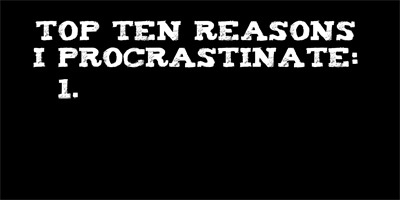Procrastination, or how to stop being a lazy ass and start living
Recently, the topic of procrastination has been especially hotly discussed on the megamind and GT, as well as many other near-IT resources. Everywhere a lot of opinions were expressed, often the opposite. Well, let's try to analyze and structure a little, read on a topic and try to find a solution.

The author is neither a doctor nor a psychologist, but is just a lazy person who is trying to learn from his own experience and also draw conclusions based on someone else's. Who cares - I ask for a cat.
So, recently a lot of articles have been published on TM sites, one way or another touching on the topic of procrastination
На основе всего изученного по этому вопросу, я могу разделить подходы на три основные группы
Прокрастинация как болезнь
Многогде сегодня высказывается мысль о том, что прокрастинация — это болезнь, и что человек, якобы, не в силах ничего поделать, а все остальные должны с уважением это понимать.
В качестве основного тезиса приводится некая теория охотника и фермера за авторством Томаса Хартмана, имеющего некие степени по гомеопатии и гербологии, а также активного деятеля NLP.
The essence of the theory is that long ago, some people were hunters, while others were farmers and gatherers. The first was important mobility and activity during the hunt, the rest of the time they were doing all sorts of other things. Others worked measuredly, keeping the concentration level constant. As a result, the descendants of the former now possess ADD, cannot concentrate in calm conditions, but show themselves well in stressful situations, while others are ordinary hard workers who just work without frills. So, those of us who suffer from this ailment are the descendants of the “hunters,” so we can concentrate on the urgent task and work hard, but in our daily routine we constantly turn our attention to lower priority tasks.
I will not condemn the theory from the point of view of genetics and the fact that the probability of the existence in all races of such genera of “hunters” and “farmers” that existed without crossing for so long that this feature was reflected at the genetic level tends to zero . I’ll leave this to people who are genetically savvy, unlike me and some homeopaths.
Let us turn to another concept widely used in American psychotherapeutic practice - ADD (G) . On the one hand, they are told why small children cannot sit still (and why they need to take Ritalin), and on the other hand, why adult uncles are lazy and do not want to work normally. Judging by the article about depression, then it turns out that a person does not begin to stop doing the necessary things himself, to be lazy and distracted, but because of some incurable diseases that are treated with various amphetamines.
We will not delve into the debate about the disease itself and its real impact on human life. One thing is obvious - accepting the fact of the disease is a very simple way to “take the blame off” for one's own laziness. Instead of undertaking something, searching for approaches to organizing one’s time and changing one’s lifestyle, a person accepts the hopelessness of the situation - “I’m not a lazy ass, I’m very, very sick, and those around me must understand this” - and gives up.
Be that as it may, the history of medicine shows that the fight against the disease, whatever it may be, brings much more benefits than humility.
Procrastination as a consequence of stress
Another version of the cause of procrastination is stressful situations. Moreover, it is more likely to be constantly in stress than short-term stress.
It cannot be denied that procrastination and stress often go hand in hand and complement each other generously. But is the second cause of the first, and not vice versa? Not sure. More likely no than yes.
Imagine a situation when you are under constant stress - for example, you do not have a very qualified boss, and you expect that you are about to get it. Or you know about staff reduction, but you don’t know who exactly will be reduced - you, or your colleague holding a similar position. In general, not a lot of pleasant things. Will such a situation cause loss of attention and difficulty in concentration? The answer is unknown.
The constant tension will really unsettle someone, and he will begin to worry, constantly reassuring himself with something, such as reading news on GT.
The other person, on the contrary, will concentrate on work so as not to fall under the distribution. Moreover, both in the short and long term.
The third one will even get motivation for more productive (than usual) work, and, undoubtedly, will be well done according to the results of the month.
And what about in the opposite direction? Everything is a little different.
Imagine (and you don’t need to imagine anything) the usual situation - a deadline in a month, the task is somehow outlined in the documentation, the roles are distributed vaguely. You can start understanding the task today, or you can start coding, in a week, in fact, for two days, but the analysis will take longer. In this position, nothing less annoying is pulling to switch - for example, the video of seals or NASA’s Martian program.
But when switching, some part of the consciousness tells itself that this is not good, that it is necessary to drop all this and get down to work. Of course, the brain does not listen to her, "but the sediment remained." So the voltage builds up. And where there is tension, there is a loss of concentration. And it entails the desire to unload the brain - to switch to something simpler than work. It turns out a vicious circle from which it is possible to exit only with great effort, and most likely, not on its own initiative.
So does distraction from tasks cause stress and loss of concentration? The answer is yes, almost always, if you don’t stop in time.
Procrastination as a manifestation of laziness
The third option, procrastination, is a fashionable name for ordinary human laziness, taken from the same bag as millennial, start-up, and SaaS per hour. We just don’t want to admit to ourselves that all of the above is our own business.
But there is also some difference that Wikipedia refers to - laziness does not seem to create anxiety, and procrastination makes you strain. But it seems that the whole matter is in some moral qualities of the person himself - some call it conscience - someone will procrastinate at least until the last minute, and they will not blink an eye. So everything is relative.
Since this option is the most probable and least enjoyable - as it usually happens - I will consider it
Based on my own experience, I can conclude that there are only a few reasons:

Unclear tasks
It often happens that the task is such that it is not clear which region to start from, and the region itself is often not defined. In such a situation, I really want to stay longer and not look for this edge - a premonition of a complex analytical task makes the brain look for easier tasks - and it easily finds them.
Little work.
Another extreme is when tasks are not enough to fill all the working time. This does not happen at all, but this is the place to be. In this case, thoughts appear like “Well, I’m reading the news, and after lunch I’ll start”, or “Well, today is Monday, I’ll give myself a break, and from Tuesday - into the battle.” It is clear what this leads to - and the wolves are not yet full, but the sheep are already so-so.
Heterogeneous tasks
Disease of leaders at different levels - leads, PMs and higher. It can also be found among freelancers, and just people who are seriously engaged in something other than their main job - for example, a hobby that takes up all their free time.
A situation is created when at one moment in time there are several urgent tasks that need to be performed. Yes, and constantly distracted. In this case, the brain begins to “boil” and seeks shortness of breath - hello procrastination. This is a really difficult situation, when the accumulated stress is very influential.

Options that don't work.
At least they didn't help me, but maybe someone will find them useful.
Options that helped
This is what will help to become productive and well done again. Of course, just following these points will not get you out of the pit, you need to “want” to get out of it, just like alcoholics do.

In conclusion, I want to say that I myself have not yet understood the Tao of “productivity” and have not stopped being lazy. But on the other hand, to stop being lazy means to stop being yourself. It is important to understand that you should try to avoid in life that does not make you happy. And happiness from meeting completed tasks is far greater than happiness from stupid laziness in the middle of a working day. This is the balance, the golden mean is to do what you need, but not to force yourself to do more than you really need.
PS: the author does not believe that everything described in the article is the ultimate truth, so he invites everyone to the discussion in the comments

The author is neither a doctor nor a psychologist, but is just a lazy person who is trying to learn from his own experience and also draw conclusions based on someone else's. Who cares - I ask for a cat.
So, recently a lot of articles have been published on TM sites, one way or another touching on the topic of procrastination
Here is some of them
Что такое прокрастинация?
На основе всего изученного по этому вопросу, я могу разделить подходы на три основные группы
Прокрастинация как болезнь
Многогде сегодня высказывается мысль о том, что прокрастинация — это болезнь, и что человек, якобы, не в силах ничего поделать, а все остальные должны с уважением это понимать.
В качестве основного тезиса приводится некая теория охотника и фермера за авторством Томаса Хартмана, имеющего некие степени по гомеопатии и гербологии, а также активного деятеля NLP.
The essence of the theory is that long ago, some people were hunters, while others were farmers and gatherers. The first was important mobility and activity during the hunt, the rest of the time they were doing all sorts of other things. Others worked measuredly, keeping the concentration level constant. As a result, the descendants of the former now possess ADD, cannot concentrate in calm conditions, but show themselves well in stressful situations, while others are ordinary hard workers who just work without frills. So, those of us who suffer from this ailment are the descendants of the “hunters,” so we can concentrate on the urgent task and work hard, but in our daily routine we constantly turn our attention to lower priority tasks.
I will not condemn the theory from the point of view of genetics and the fact that the probability of the existence in all races of such genera of “hunters” and “farmers” that existed without crossing for so long that this feature was reflected at the genetic level tends to zero . I’ll leave this to people who are genetically savvy, unlike me and some homeopaths.
Let us turn to another concept widely used in American psychotherapeutic practice - ADD (G) . On the one hand, they are told why small children cannot sit still (and why they need to take Ritalin), and on the other hand, why adult uncles are lazy and do not want to work normally. Judging by the article about depression, then it turns out that a person does not begin to stop doing the necessary things himself, to be lazy and distracted, but because of some incurable diseases that are treated with various amphetamines.
We will not delve into the debate about the disease itself and its real impact on human life. One thing is obvious - accepting the fact of the disease is a very simple way to “take the blame off” for one's own laziness. Instead of undertaking something, searching for approaches to organizing one’s time and changing one’s lifestyle, a person accepts the hopelessness of the situation - “I’m not a lazy ass, I’m very, very sick, and those around me must understand this” - and gives up.
Be that as it may, the history of medicine shows that the fight against the disease, whatever it may be, brings much more benefits than humility.
Procrastination as a consequence of stress
Another version of the cause of procrastination is stressful situations. Moreover, it is more likely to be constantly in stress than short-term stress.
It cannot be denied that procrastination and stress often go hand in hand and complement each other generously. But is the second cause of the first, and not vice versa? Not sure. More likely no than yes.
Imagine a situation when you are under constant stress - for example, you do not have a very qualified boss, and you expect that you are about to get it. Or you know about staff reduction, but you don’t know who exactly will be reduced - you, or your colleague holding a similar position. In general, not a lot of pleasant things. Will such a situation cause loss of attention and difficulty in concentration? The answer is unknown.
The constant tension will really unsettle someone, and he will begin to worry, constantly reassuring himself with something, such as reading news on GT.
The other person, on the contrary, will concentrate on work so as not to fall under the distribution. Moreover, both in the short and long term.
The third one will even get motivation for more productive (than usual) work, and, undoubtedly, will be well done according to the results of the month.
And what about in the opposite direction? Everything is a little different.
Imagine (and you don’t need to imagine anything) the usual situation - a deadline in a month, the task is somehow outlined in the documentation, the roles are distributed vaguely. You can start understanding the task today, or you can start coding, in a week, in fact, for two days, but the analysis will take longer. In this position, nothing less annoying is pulling to switch - for example, the video of seals or NASA’s Martian program.
But when switching, some part of the consciousness tells itself that this is not good, that it is necessary to drop all this and get down to work. Of course, the brain does not listen to her, "but the sediment remained." So the voltage builds up. And where there is tension, there is a loss of concentration. And it entails the desire to unload the brain - to switch to something simpler than work. It turns out a vicious circle from which it is possible to exit only with great effort, and most likely, not on its own initiative.
So does distraction from tasks cause stress and loss of concentration? The answer is yes, almost always, if you don’t stop in time.
Procrastination as a manifestation of laziness
The third option, procrastination, is a fashionable name for ordinary human laziness, taken from the same bag as millennial, start-up, and SaaS per hour. We just don’t want to admit to ourselves that all of the above is our own business.
But there is also some difference that Wikipedia refers to - laziness does not seem to create anxiety, and procrastination makes you strain. But it seems that the whole matter is in some moral qualities of the person himself - some call it conscience - someone will procrastinate at least until the last minute, and they will not blink an eye. So everything is relative.
Since this option is the most probable and least enjoyable - as it usually happens - I will consider it
Causes of Procrastination
Based on my own experience, I can conclude that there are only a few reasons:
- obscure tasks
- little work
- heterogeneous tasks

Unclear tasks
It often happens that the task is such that it is not clear which region to start from, and the region itself is often not defined. In such a situation, I really want to stay longer and not look for this edge - a premonition of a complex analytical task makes the brain look for easier tasks - and it easily finds them.
Little work.
Another extreme is when tasks are not enough to fill all the working time. This does not happen at all, but this is the place to be. In this case, thoughts appear like “Well, I’m reading the news, and after lunch I’ll start”, or “Well, today is Monday, I’ll give myself a break, and from Tuesday - into the battle.” It is clear what this leads to - and the wolves are not yet full, but the sheep are already so-so.
Heterogeneous tasks
Disease of leaders at different levels - leads, PMs and higher. It can also be found among freelancers, and just people who are seriously engaged in something other than their main job - for example, a hobby that takes up all their free time.
A situation is created when at one moment in time there are several urgent tasks that need to be performed. Yes, and constantly distracted. In this case, the brain begins to “boil” and seeks shortness of breath - hello procrastination. This is a really difficult situation, when the accumulated stress is very influential.

Solutions to the problem
Options that don't work.
At least they didn't help me, but maybe someone will find them useful.
- Categorization of tasks - the well-known matrix is important — not important / urgent — not urgent, which is promoted by time management trainers, and it already exists in Outlook — it all ends when the task is divided into these categories
- Different blocking of extraneous sites in the browser is a hoax over a hoax, nothing will work. The lazy self turns out to be trickier
- Programs like - don’t look at the phone for an hour - there’s a field of trees - you just hammer on them, since there is even less practical benefit from them than irritation
- Articles of the type “15 habits of a productive person”. No, they work. First time. If you live exactly as the person described in the article. But, most likely, you will not be able to instill these habits for yourself, very quickly losing motivation. Or they won’t suit you at all. No, habits are developed from debugged and resultant actions, and not because of the very desire to “develop the habit of X”.
Options that helped
This is what will help to become productive and well done again. Of course, just following these points will not get you out of the pit, you need to “want” to get out of it, just like alcoholics do.
- Recognizing that you are a lazy ass, and that is the reason for everything.
The most difficult step. You can break down for a long time, read about “12 principles of productivity” or “30 things that successful people do”, but just stay in place. Being lazy does not mean being bad. This is normal. It `s naturally. Utilitarianism tells us that all good actions are those that make a person happy or beneficial. The happiness of laziness is much closer and more understandable than the indistinct benefit of “later” in exchange for work “now”. This is the nature of man, and there is no escape from it. It is necessary to accept this postulate in order to be able to curb your inner idler and make him work in order to rest “later” when the work is completed. - Time management
This is a difficult thing, and no time management courses can motivate enough.
However, I found a simple hack - the Pomodoro technique . The bottom line is to work for 25 minutes, and rest between them for 5, and take a long break every two hours (for example, for tea). It sounds so-so, but it really works, especially when there is a lot of work. If you have several tasks at the same time, allocate for each a certain number of intervals of 25 minutes, and do not switch between them at this time.
For convenience, I downloaded the program on my phone, but in my office there are people who bring a real kitchen timer to work. - Time Management 2
Make a to-do list for the day. Keep a calendar. Better when they are in sync. I use aCalendar and GTasks, they synchronize with Google Calendar and with each other. Very convenient and free. - Keep information handy
Keep all the documents you need in the cloud storage - in the one that is more convenient for you. Put the order in the folder hierarchy so that nothing is unclear where. This greatly simplifies the search for documents, and also reduces stress due to the fact that the necessary files are scattered across several computers / flash drives / mails - Set Your Goals
No, seriously. Set goals for six months, a year, and so on. And as abstract as possible - for example, not “learn English” but “go through online certification to such a level of language”, or not “learn Django”, but “view such a course, write a website on Django”. All this sounds trite, but it really sets up a working mind, helps to somehow plan actions to achieve these goals.
Here too: encourage yourself for the goals you have achieved. Decide how. - Daily routine
This does not mean that you need to get up with the first roosters, and go to bed at sunset - no. Just get up and go to bed at the same time every day, including weekends. I don’t know how, but it invigorates the body and cleanses the brain. - Meditation is a
funny thing. When you feel intense tension, just close your eyes and try not to think about anything for about five minutes. Not really about anything. Visibly raises the tone. This, of course, is a great approximation of meditation, but the essence is this. Of the minuses - colleagues will try to wake you up.

Total
In conclusion, I want to say that I myself have not yet understood the Tao of “productivity” and have not stopped being lazy. But on the other hand, to stop being lazy means to stop being yourself. It is important to understand that you should try to avoid in life that does not make you happy. And happiness from meeting completed tasks is far greater than happiness from stupid laziness in the middle of a working day. This is the balance, the golden mean is to do what you need, but not to force yourself to do more than you really need.
PS: the author does not believe that everything described in the article is the ultimate truth, so he invites everyone to the discussion in the comments
